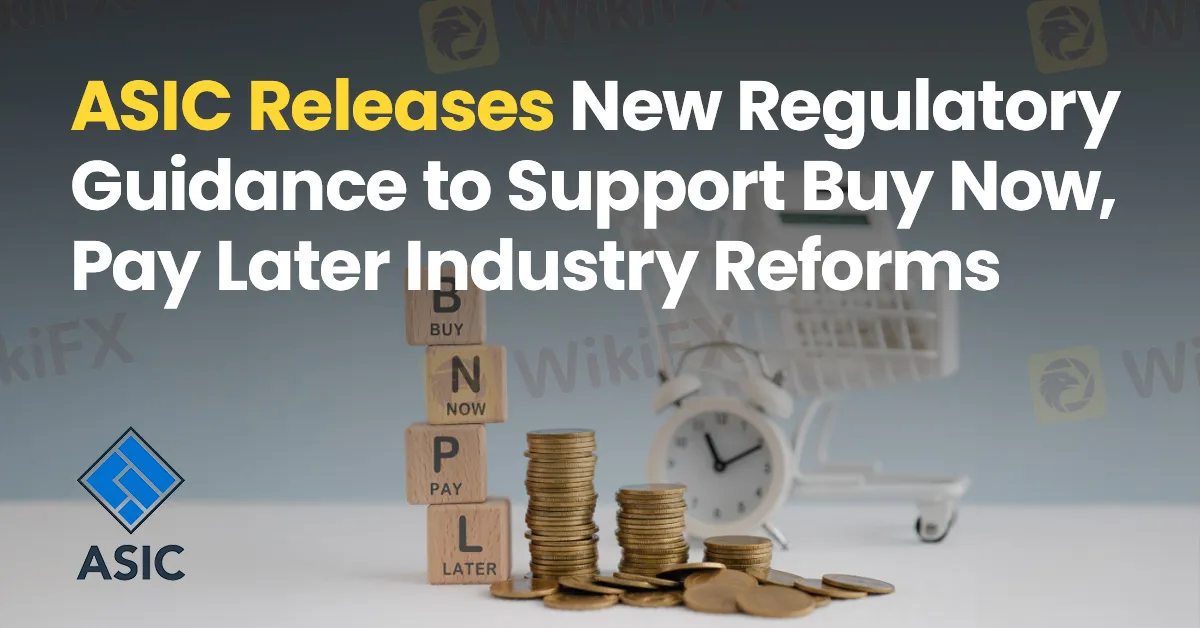简体中文
繁體中文
English
Pусский
日本語
ภาษาไทย
Tiếng Việt
Bahasa Indonesia
Español
हिन्दी
Filippiiniläinen
Français
Deutsch
Português
Türkçe
한국어
العربية
ASIC Releases New Regulatory Guidance to Support Buy Now, Pay Later Industry Reforms
Abstract:The Australian Securities and Investments Commission (ASIC) has published a new regulatory guide aimed at assisting buy now, pay later (BNPL) providers in navigating their obligations ahead of new laws coming into effect on June 10, 2025. The guidance, titled Regulatory Guide 281: Low-cost credit contracts, provides critical information to help low-cost credit contract providers comply with their key responsibilities, including new, modified responsible lending obligations.

The Australian Securities and Investments Commission (ASIC) has published a new regulatory guide aimed at assisting buy now, pay later (BNPL) providers in navigating their obligations ahead of new laws coming into effect on June 10, 2025. The guidance, titled Regulatory Guide 281: Low-cost credit contracts, provides critical information to help low-cost credit contract providers comply with their key responsibilities, including new, modified responsible lending obligations.
ASIC Commissioner Alan Kirkland emphasized the significance of these reforms, stating, “These reforms are an important step to improve protection for Australian consumers who use buy now, pay later products.”
The new regulatory guide follows the release of ASIC's draft guidance and Consultation Paper 382, Low-cost credit contracts, in February. In response to feedback from 16 submissions received from various stakeholders, including BNPL providers, industry associations, and consumer advocates, ASIC has made clarifications and added practical examples to the guide to ensure better understanding and compliance.
One of the key aspects of the reforms is the licensing requirement for BNPL providers. “We strongly encourage buy now, pay later providers who do not already have the appropriate credit licence to apply for one as soon as possible,” Kirkland noted. Providers who fail to submit a credit licence application for lodgement with ASIC by June 10, 2025, may find themselves operating unlawfully, engaging in unlicensed conduct.
Under the new framework, BNPL contracts that meet the definition of a low-cost credit contract will face certain obligations that differ from traditional credit contracts. For instance, providers of low-cost credit contracts will have the option to comply with modified responsible lending obligations, which are tailored to reflect the unique nature of BNPL products.
In January 2025, ASIC also released Information Sheet 285, which outlines the specific licensing requirements for entities involved in credit activities related to BNPL contracts. This is an essential resource for any provider seeking clarity on how to navigate the new regime and ensure compliance with the law.
With these important regulatory updates, ASIC continues its commitment to ensuring that the BNPL industry operates with consumer protection at the forefront. The new regulatory framework marks a significant milestone in the evolution of the BNPL sector, paving the way for a more transparent and accountable industry. Providers are urged to familiarize themselves with the updated rules to avoid any legal challenges in the future.

Disclaimer:
The views in this article only represent the author's personal views, and do not constitute investment advice on this platform. This platform does not guarantee the accuracy, completeness and timeliness of the information in the article, and will not be liable for any loss caused by the use of or reliance on the information in the article.
Read more

TradexMarkets: 5 Troubling Signs You Shouldn’t Ignore
Stop! Read this article if you're thinking about using TradexMarkets. There are several warning signs that suggest this broker may not be safe. Check out this article to find out why. Be safe.

WeTrade Marks 10th Anniversary with Global Campaign, Upgrades and Rewards
The leading financial broker celebrates a decade of excellence with worldwide screen takeovers viewed by millions

Investment Scam Alert: FCA Identifies 15 Scam Brokers
UK Financial regulator, FCA (Financial Conduct Authority) has issued warnings against 15 forex brokers operating without proper authorization. Checkout the list below & Be Scam ALERT .

SEC Implements New Rules for Crypto-Asset Service Providers
The SEC enforces new 2025 rules and guidelines for Crypto-Asset Service Providers (CASPs) to strengthen regulation, compliance, and investor protection in the Philippines.
WikiFX Broker
Latest News
XS.com Broker Partnership Expands Liquidity with Centroid Integration
EC Markets: A Closer Look at Its Licenses
Housewife Scammed of RM68,242 in Online Investment Scam
From Charts to Profits: Unleashing the Power of Forex Trading Tools
FCA Publishes New Warning List! Check It Now to Stay Safe
Beware of Fake RS Finance: How to Spot Scams
Fortune Wave Solution: SEC Warns of Investment Scam
D. Boral Capital agrees to a fine as a settlement with FINRA
Is TD Ameritrade Safe? How to Spot Fake URLs and Stay Protected
Before You Trade with Quest: 6 Warning Signs to Know
Currency Calculator


